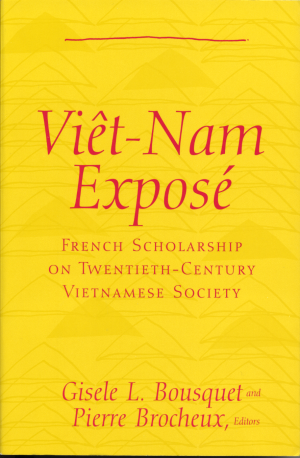Publications
Publications
Contributions
Contributions
[This
paper is translated from french by Duy Tâm.]
Rethinking the Status of Vietnamese Women
in Folklore and oral History

The Representation of Incest in Oral Tradition
Let us go back to the
notion of incest. If many societies repress incestuous acts, others
seem either indifferent or consenting, and one is not lacking of such
examples. In the Vietnamese oral tradition, there is this instance:
Con gai muoi bay cho ngu voi cha
Con trai muoi ba cho nam voi me.
(A girl of seventeen, let her not sleep with her father
A lad of thirteen, let him not lie with his mother).
This proverb is to be
construed as a recommendation or a prohibition. If society needs to
make certain rules under a prohibitive form in order to preserve
social harmony and morality, it may be that it is faced with a
situation which it deems to be alarming. In other words, if certain
things need be so expressly spelt out, one can assume, with more or
less certainty, that such things found their cause in reality. Be
that as it may, prohibition in any society responds to a reality,
whether social, human, moral, cultural, political or economic. It
concerns those practices that constitute a menace to the community or
are in contradiction with it, one does not forbid a thing or a
concept that does not exist. Which government would forbid, say,
people to look at themselves in a mirror? Vietnamese society has
given cause to many a telling proverb.
Chau cau ma lay chau co
Thoc lua day bo giong ma nha ta
(If the maternal uncle's nephew marries the paternal aunt's niece
our house will have its stores full of rice)
Vua chua cam doan lam chi
De doi con di chang lay duoc nhau
(Wherefore do kings and lords forbid
two sisters' children to marry each other)
The
first proverb gives clear indications as to degree of kinship between
the spouses. The union in this case is judged auspicious and shall
bring prosperity. In fact, the nephew/niece (
chau) of the
maternal uncle (
cau) and the niece/nephew of the paternal aunt
(
co) are, in an indirect manner, termed as «siblings».
Their union is assimilated to an incest which, far from being
disapproved, seems highly commended. As for the second proverb, it
does not only tell that the prohibition was decreed by kings and
lords
but also that the common people, on the contrary, did not mind
intermarriages, namely, in the case of first cousins. In the
religious tradition, the couple «
Ong Dung Ba Da»,
who, according to the legend, are brother and sister, is worshipped
as tutelar genii, in the Red River Delta
Without attempting to go through all the world's traditions, one
notes the presence, as in most founding myths, of an original couple,
either a brother and a sister, or a mother and a son. In Greek
mythology, it is Gaia who, at the beginning of the universe, mates
with her son Uranus in order to beget the Titans. With the Baruyas of
New-Guinea, the founding myth traces the origin of mankind back to
the primordial union of a brother and a sister
Could one not regard these tales as some crystallization of the human
collective memory, bequeathed from generation to generation under the
form of myths? In other words, could these not be some sort of
archetypes whose authors have been lost in the limbos of immemorial
time? In spite of this original incest - which may shock the more
sensitive souls - Greek myths have never ceased to occupy one of the
most highly-regarded chapters in the history of human civilization.
If confucianism, however, considered such incestuous acts as a menace
to law and order, the common people saw no cause for reprimand in
unions involving kinsmen, at least to a certain degree of
relationship.
On
the linguistic level, the Vietnamese word for incest is
loan luan,
a Chinese-based word, which means literally: «anarchical
morals, inverted or drifting morality». If the Vietnamese had
to borrow the word from the Chinese, it is because the idea of
«incest» probably did not exist in their body of
conceptual representations. Had such a state of affairs posed, in
their eyes, any problem, they surely would have created a word for
it. Is a foreign word not clear evidence that the object or concept
which is described in the language borrowed from did not exist one's
own one? Examples abound.
However,
one needs to be circumspect when dealing with this kind of question -
fascinating as it may be, in fact, one of the anthropologist's most
studied subjects - for its emotional load is most explosive. The
past, whether it be historical or mythical, cannot be gauged with
today's eyes, since every period has its own
raison d'être
and its proper representational system, nevertheless it would be as
absurd to defend a custom on the sole merit of its finding its cause
in the past. The quest for meaning is paramount and prior to any
other consideration, be it ideological or philosophical, affective or
moral. Unless and until the hidden meaning has been cleansed of its
parasites, one cannot hope to see a glimmer of comprehension.
Notes
|
Sommaire de la rubrique
|
Haut de page
|
Suite
|









